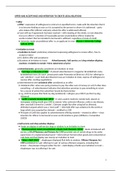Summary
Summary Offer and Acceptance - Contract Law (LLB)
- Module
- Contract Law
- Institution
- City University (City)
Offer, Acceptance and Intention to create legal relations Summarised Notes for the Contract Law module, LLB, at City, University of London (achieved a 1st class using these) - can of course be used for other universities as well! Would recommend the full bundle of notes
[Show more]



